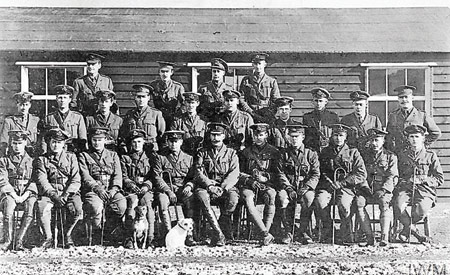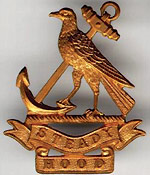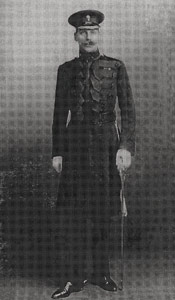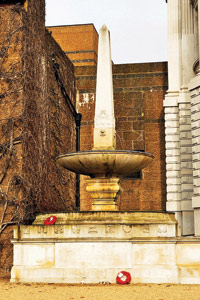|
THE ROYAL NAVAL DIVISION MEMORIAL
AND THE HOOD BATTALION
by Major P A J Wright OBE
formerly Grenadier Guards
|
The Royal Naval Division Memorial is dedicated to the 45,000 members of the Royal Naval Division who died during the First World War. The memorial, designed by Sir Edwin Lutyens, is located in the northwest corner of Horse Guards Parade next to the Old Admiralty Buildings. The Royal Naval Division was formed in 1914 by Winston Churchill as an intervention force, fighting in World War I at Gallipoli and on the Western Front before being disbanded in 1919. The memorial takes the form of a stone obelisk and fountain. It includes an inscription by Rupert Brooke, who died on active service with the Hood Battalion of the Royal Naval Division in the Dardanelles in 1915.
 Officers of the Hood Battalion at Blandford Camp Officers of the Hood Battalion at Blandford Camp
Lt Rupert Brooke Middle Row second left Lt Col Quilter Front Row centre |
The Royal Naval Division was despatched in an unsuccessful attempt to save Amsterdam in October 1914. The men were untrained and transported in London omnibuses. Major J A C Quilter, Captain A E Maxwell and Lieutenant W R C Murray, all Grenadier officers, were lent to the Division. Captain Maxwell was severely wounded in the subsequent fighting and afterwards died, but the other two returned safely to England. Quilter, who remained attached to the Division, was gazetted Lieutenant Colonel to command the Hood Battalion. He was killed later in the Dardanelles aged 40 and is buried at Skew Bridge Cemetery in Turkey.
Quilter was born on 29th January 1875, the second son of Sir Cuthbert Quilter Bt of Bawdsey Manor, Suffolk. After Eton and Cambridge, he joined the Grenadier Guards in 1897 and served with distinction in the South African War. He was Mentioned in Despatches for conspicuous bravery at the battle of Biddulphsberg in May 1900. While fighting the Boers a bush fire broke out. Quilter and a few men from 1 Company, 2nd Battalion, were determined to rescue who they could and putting down their weapons, plunged into the smoke and flames, returning with a number of wounded. For this courageous action, they were recommended for awards but were refused on the strictly correct, though ungenerous grounds that they had laid down their arms in the process. The total losses in this agonising battle were 148, of whom almost fifty were killed or burnt to death.

Cap badge of the Hood Battalion
|
In 1913, Quilter performed the duties of ADC to Lord Denman, Governor General of Australia. The Denmans returned to England in May 1914, ostensibly because of Lord Denman’s ill health. The real cause was reported to have been an affair between Lady Denham and Quilter. When war broke out in 1914, Quilter was appointed commanding office of the Hood Battalion, 63rd (Royal Naval) Division, in September 1914. His height alone - six foot seven - gave him a natural authority and he was seen by his men as a perfect gentleman. Somewhat shy but undoubtedly brave and resolutely soldierly, his subordinates found him an inspiring commander who was responsible for establishing the enduring foundation of espirit de corps which proved to be strong in the Battalion. In 1915 the Battalion was sent to the Mediterranean to fight the Turks on Gallipoli.
Under Quilter’s command were a group of young officers known as the ‘Latin Club’ which included Arthur Asquith, son of the Prime Minister, the musician Denis Browne, poet Patrick Shaw-Stewart and future New Zealand Governor General, Bernard Freyberg. The brilliant war-poet Rupert Brooke was the most notable member of this group. Brooke died aged 27 on 23rd April 1915, from sepsis which developed after a mosquito bite. He was buried in his ‘corner of a foreign field, that is forever England’, on Skyros Island in the Aegean Sea, on the eve of the Gallipoli landings. The coffin was lowered into a grave with sprigs of olive and sage flowers. Colonel Quilter threw in a wreath made of olive leaves and a short service by the grave followed by three volleys then took place. The Last Post was sounded by a bugler.
 Lieutenant Colonel J A C Quilter, Grenadier Guards
Lieutenant Colonel J A C Quilter, Grenadier Guards |
A few days later, on 29th April 1915, the Hood Battalion landed at ‘V’ Beach at the end of the Helles Peninsular. Ordinary Seaman Murray recalled Quilter saying ‘The eyes of the world would be upon us’. The eyes of the Turks certainly were and so were their rifles. The scene as they landed was a terrible one. There were heaps of bodies with up to thirty bodies in each heap. The next day the Battalion went forward to take its place in the line. A hill called Achi Baba, about 700 feet in height, dominated the entire area, enabling the Turkish Army dug-in on its slopes to view the whole of the British activity below. Hood Battalion was to take part in a futile attempt to drive the Turks from these heights.
On 6th May 1915, the Battalion moved off in sight of Achi Baba Hill some 2 miles away. Soon they came under enemy fire taking heavy casualties as they went forward attacking in ‘rushes’. The Commanding Officer, Quilter, striding out leading his men, ‘oversized walking stick’ in hand, had been shot in the chest quite early in the advance. He died soon afterwards. In the attack, the Battalion sustained casualties totalling 10 officers and 343 men.
At 8am on 7th May, Quilter’s body was laid to rest in the presence of the Commander and staff of 2nd Naval Brigade. A firing party from his Battalion fired three volleys over the grave as their last token of respect and the buglers sounded the Last Post. The funeral took place under a hail of shrapnel but there were no casualties. It was the only occasion on which an officer in Gallipoli was buried with full military honours.
The inscription of Rupert Brooke’s sonnet on the Royal Naval Division Memorial reads:
BLOW OUT YOU BUGLES, OVER THE RICH DEAD / THERE’S NONE OF THESE SO LONELY AND POOR OF OLD / BUT, DYING HAS MADE US RARER GIFTS THAN GOLD / THESE LAID THE WORLD AWAY: POURED OUT THE RED / SWEET WINE OF YOUTH; GAVE UP THE YEARS TO BE. / OF WORK AND JOY, AND THAT UNHOPED SERENE / THAT MEN CALL AGE: AND THOSE WHO WOULD HAVE BEEN / THEIR SONS, THEY GAVE THEIR IMMORTALITY
 The Royal Naval Division Memorial, Horse Guards Parade The Royal Naval Division Memorial, Horse Guards Parade |
|
|




 The Royal Naval Division Memorial, Horse Guards Parade
The Royal Naval Division Memorial, Horse Guards Parade